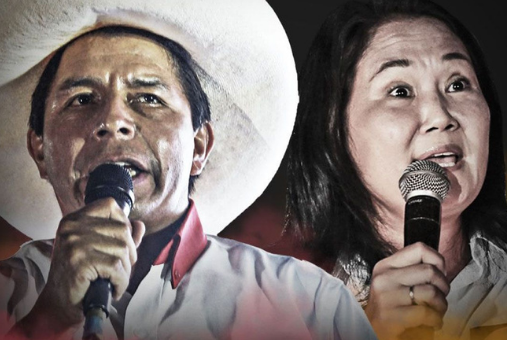After nine years in her position, Colombian journalist Clara Elvira Ospina was fired as news director of América TV and Canal N, two of the most important television outlets in Peru, which also belong to Grupo La República and Grupo El Comercio, the latter being the majority shareholder. Ospina's dismissal occurred just a month before the second round of the presidential elections, in an extremely polarizing contest.
According to the director of Grupo La República, Gustavo Mohme, a minority shareholder of both television channels, the dismissal occurred shortly after a meeting that Ospina and other editors of news programs held with the candidate Keiko Fujimori.

Presidential candidates in Peru, Pedro Castillo and Keiko Fujimori. (Courtesy)
The candidate, currently being investigated as the alleged head of a criminal organization by the public prosecutor, is the daughter of former President Alberto Fujimori (1990-2000), who has been in prison since 2009 for crimes against humanity committed during his government.
According to a person related to the event, Ospina allegedly told Fujimori that media under her direction would not favor her party or that of her rival, but would cover the activities of both candidates for the election in an extensive and impartial manner in the second round.
Grupo El Comercio, the country's largest media conglomerate, published on April 24 that Ospina would no longer be the journalistic director of América TV and Canal N.
Mohme, two-time president of the Inter-American Press Association (IAPA), wrote in his editorial column on May 10 that Ospina's firing was arbitrary. As of the departure of the journalistic director, Mohme resigned from the editorial advisory council of América TV, of which he was a member.
"I do not want to be a silent troupe of these legal shenanigans that seeks to arbitrarily impose who will assume the reins of the main television channel in the country, after the untimely and unreasonable dismissal of Clara Elvira Ospina, between the first and second rounds of the present electoral process," Mohme wrote in his May 10 opinion column.
Mohme referred to Ospina's dismissal as interference by Grupo El Comercio in the editorial line of news programs in the context of elections.
This fact "takes them away from the guiding principle of reporting with the truth," Mohme told LatAm Journalism Review (LJR). “Self-censorship and lack of relevant information are the terrible consequences [of the dismissal] for the rest of the journalistic team. The journalist loses and the audience loses.”
For Diego Salazar, former editor of newspaper Perú21, of Grupo El Comercio, and author of the book "We have not understood anything: What happens when we leave the future of the press at the mercy of an algorithm," Ospina's dismissal one month from the second electoral return is a "very serious mistake.” Salazar told LJR that this has a precedent, that the same situation occurred in the 2011 electoral campaign, when the journalistic director of Canal N was fired at the time for "humanizing" candidate Ollanta Humala.
Humala, like the current candidate Pedro Castillo, faced several-time presidential candidate Keiko Fujimori in the second round, winning the 2011 elections.
“It is not only responsible to its shareholders or its board of directors, a communication company has a responsibility to its audience. And that responsibility clearly indicates that in the middle of an electoral campaign with a polarization like this, that if you lay off the news director from the two main channels of the country, well that is an obvious sign that you are seeking to intervene in the electoral campaign in a way that is not journalistic," Salazar said.
Eduardo Dargent, columnist for newspaper El Comercio and professor of political science at the Pontifical Catholic University of Peru, agreed with Salazar about the “strong déjà-vu” that Ospina's dismissal signifies when he remembered what happened with Laura Puertas, then-journalistic director of Canal N and América TV in 2011.
“If we remember 2011, they had to work a lot of time to regain credibility, both in the newspaper and on the television, and build the idea that freedom of expression is a value in itself, and not a mechanism to defend business interests,” Dargent told LJR.
Laura Puertas was untimely fired in December 2011, a year in which there were also presidential elections and Keiko Fujimori lost the second round to candidate Humala. At that time, Mohme described the firing of Puertas as "unacceptable mistreatment," and he resigned at that time from the channel's editorial advisory council.
According to Dargent, as in 2011, Fujimori faces another candidate considered anti-establishment. At that time it was Ollanta Humala and now it is Castillo, from the Peru Libre party. Communist political tendencies and questionable political relationships, such as those linked to Movadef, the political arm of the Shining Path terrorist movement, are attributed to Castillo, according to a CNN report.
“Precisely the party [of Castillo] that is criticizing the establishment and that brings the critical vote, what it says is that the media is a mask, that the freedom of expression that the media has in their ideologies is like a mask to actually protect privileges,” Dargent said.
"Taking this type of action [to dismiss journalistic directors untimely] ends up confirming that diagnosis. It is like giving reason to whoever tells you that the media are not going to be balanced, but that they are going to be tools for political use."
The team of the investigative journalism program Cuarto Poder de América TV, one of the most important programs in the country, sent a letter to the channel's board of directors, expressing its concern about the dismissal of the journalistic director and its consequences on the credibility and image of the program. The letter was released on May 15 after being leaked on Twitter.

Journalist Clara Elvira Ospina. (Facebook)
“Our position is one of absolute respect for the Guiding Principles of América Televisión, the set of ethical standards that have been the pillar of our journalistic work. For this reason, we think that the decision and the moment to withdraw the confidence of the former journalistic director Clara Elvira Ospina has represented serious damage to the work we do and to the image of the program. During her management, we work with the plurality, impartiality, rigor and objectivity contained in the Guiding Principles of this publishing house,” the letter said.
The journalists also pointed out that the right and duty to truthful and impartial information must transcend any business decision.
Grupo El Comercio preferred not to comment to LJR about Ospina's dismissal.
In a survey published in mid-May, the Peruvian Studies Institute (IEP) conducted an opinion poll on the media and the electoral campaign.
According to the survey, 59 percent of respondents agreed that there is favoritism towards a particular candidate in media coverage. Among those who claimed to perceive media favoritism towards a candidacy, 79 percent considered that the media favors Keiko Fujimori.
Regarding the IEP opinion poll, Mohme said that the data only show the "informational imbalance" perceived by citizens in the current electoral situation. "The capital of journalists is credibility ... and the information imbalance could be translated as manipulation," he emphasized.
In Salazar's opinion, it is evident that the majority of the media, including the main media in the country, have been reporting in favor of Fujimori, "with greater or lesser intensity or shame or shamelessness."
“I think that, at the same time, we are going to see the same intensify on the other side; We have already begun to see it today with the cover of La República,” Salazar said, referring to the fact that La República has not included in its coverage the statements of a member of Castillo's party, who said they will not give up the power of being elected.